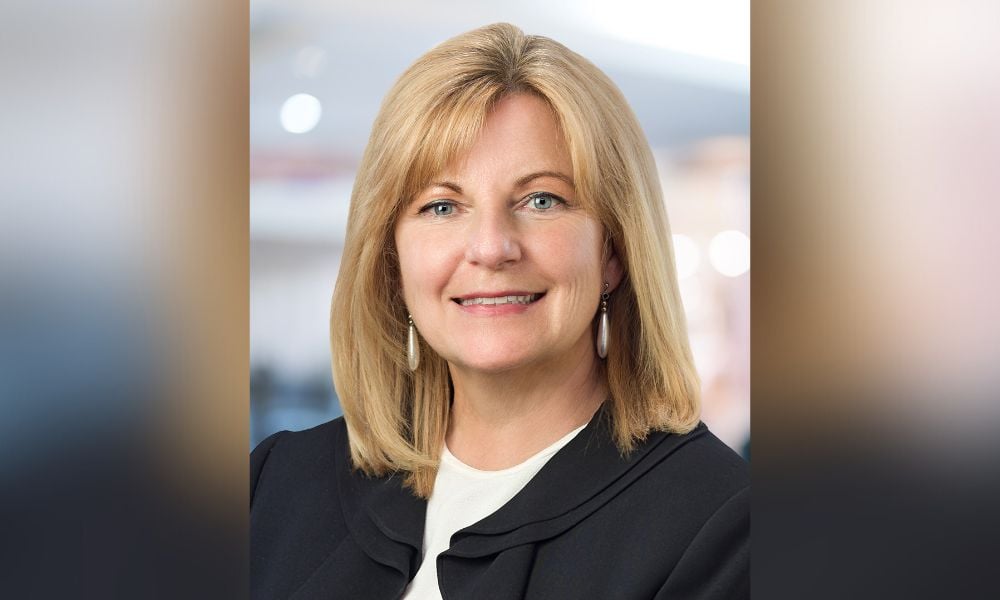As far as origin stories go, Christina Kobi's is pretty straight-forward. Like the hero in an adventure story, her future was basically foretold back when she was a child in Paris, Ontario.
“My career path began when I was just a kid, and I have been laser-focused for 45 years,” she says. “As a child, I must have been pretty argumentative, because everyone—and I mean everyone, including my parents, extended family, friends of my parents, their employees – all said ‘Christina should be a lawyer.’ And the more I thought about it, the more I knew in my heart, Yes, I wanted to be a lawyer.”
She was a country girl with dreams of becoming a big city lawyer. But she wasn’t about to wait to see if the dream would come true. She was going to prepare. To that end, when she was ten, while other kids might be writing to their celebrity crush, she wrote a letter to the Law Society of Upper Canada. She wanted their advice on how she could become a lawyer, along with some old LSAT tests.
“I had a focus and passion, which never waivered. I honestly never yearned to be anything but a lawyer,” she says.
Her academic prowess led her to the University of Toronto, Trinity College, where she graduated with High Distinction in 1992. An Honours Bachelor of Science, specializing in Quantitative Methods, laid the groundwork for a legal career that would span over two decade. In 1995, after completing her Bachelor of Laws at the University of Toronto Faculty of Law, she was called to the Bar in February 1997. Her father passed away a few months later, but he was able to see her achieve her goal—and prove the whole family right.
Kobi's legal path led her to Goodman and Carr LLP, where she entered the world of leasing law. It was here that she discovered her niche, despite it not being the glamorous field that one might envision.
“I don’t think anyone dreams of being a 'Leasing Lawyer.' It’s not very sexy," she says. “My original plan was to get into corporate law (mainly because my father was an entrepreneur), but at that time, G&C was widely known as being the pre-eminent law firm in Canada for Commercial Leasing. They were the best of the best – a large department of lawyers, separate and distinct from the RE department, who focused on Commercial Leasing. There were all senior partners without any Associates.”
That is, until she joined. Despite the initial challenges and pressures of being the only associate in a department filled with seasoned partners, Kobi quickly became a specialist. Her mentor, Ariella Rohringer, played a pivotal role in her early years, guiding her towards becoming an expert in commercial leasing.
" Ariella volun-told me to be a Roundtable Leader at an ICSC Law Conference. I had to quickly become an expert on that topic so that I could sit for 30 minutes and provide guidance to other lawyers in the industry," she recalls.
In 2003, Kobi transitioned to Minden Gross, a mid-sized law firm, where she continued to carve her niche in the world of commercial leasing. The year 2005 marked a significant milestone as she became an equity partner at Minden Gross. It turned out to be a milestone for Minden Gross as well.
“My daughter was born after I became a Partner, and that was intentional,” she explains. “It was generally understood that for female lawyers, having children would slow the partnership track, and possibly even de-rail it. And so I waited. Which was good and bad. In fact, I was the first equity partner at the firm to take Mat Leave. They weren’t sure how to do it.”
However, the twists in Kobi's career were not confined to successes alone. In 2015, she took a leap of faith, leaving Minden Gross for McLean and Kerr LLP. It was a move driven by a desire for professional growth and independence.
"Moving law firms was intimidating. MG had been my home for 17 years and I was happy. Not surprisingly, leaving (with myself and my team) created some chaos and tensions flared,” she recalls. “I was proud of myself for taking the leap and believing in myself, but at the same time, it was stressful as I had to start a brand new practice and build a new client base. I preferred being the “worker bee” – the one in the office with my head down doing top-quality work. Having to embark on business development was a gut-wrenching experience, but it forced me out of my comfort zone and I learned that I could do it well.”
Returning to Minden Gross in 2017 after 18 months, Kobi found herself on a new trajectory. She was on the map, so to speak. “They could see the new book-of-business that I had built on my own, and as a result, I did better financially and I had earned a new-found respect simply because I proved to them (and myself) that I could ‘do it on my own.’”
But, not enough women seemed to be able to do the same thing. "When I first started as a lawyer, the legal industry was male dominated, especially commercial real estate law. There was a lot of 'Old Boys Club' mentality."
“In any male-dominated industry, there will be some bad eggs. I have personally witnessed and experienced some ‘bad stuff’ over my many years,” she says. One that always comes to mind is when a client on a big transaction refused to make eye contact with lead real estate lawyer on the transaction because she was female. “It was quite shocking,” she says.
In spite — or because — of these challenges, Kobi has been a steadfast advocate for diversity and mentorship. She acknowledges the progress made but stresses the need for more women in leadership roles within law firms.
As technology reshaped the legal landscape, Kobi witnessed a shift from handwritten leases to negotiations conducted on computer screens during virtual meetings. The pace of negotiations accelerated, bringing new challenges.
"Now most people don’t even print Leases and negotiations are done on the computer screen – sometimes on-the-spot while screen sharing during a virtual meeting. As a result, turnaround expectations are ridiculous!"
Looking to the future, Kobi anticipates the integration of AI programs in leasing processes. While AI may handle straightforward deals, the need for experienced leasing lawyers will remain paramount for complex matters and creative problem-solving.
And being good at arguing will always be a plus. And Kobi has been doing that her whole life.
***
 Christina Kobi is a Partner in the Commercial Leasing Group specializing in all aspects of commercial leasing, including retail, office, and industrial, and related practice areas such as development agreements for rooftop solar leases/licenses, telecommunications license agreements, and tenancy matters. Christina is recognized by Best Lawyers in Canada, The Lexpert®/American Lawyer Guide to the Leading 500 Lawyers in Canada, and The Canadian Legal Lexpert Directory as one of Canada's leading lawyers in the area of Property Leasing Law.
Christina Kobi is a Partner in the Commercial Leasing Group specializing in all aspects of commercial leasing, including retail, office, and industrial, and related practice areas such as development agreements for rooftop solar leases/licenses, telecommunications license agreements, and tenancy matters. Christina is recognized by Best Lawyers in Canada, The Lexpert®/American Lawyer Guide to the Leading 500 Lawyers in Canada, and The Canadian Legal Lexpert Directory as one of Canada's leading lawyers in the area of Property Leasing Law.
Christina has expertise in sophisticated and volume leasing for major developers, and in managing and coordinating major lease-related projects, including due diligence lease reviews on behalf of purchasers and lenders and in sale/leaseback transactions. She acts for national property managers, international retailers, national banks, developers, landlords, tenants, franchisors, and franchisees.
With Christina, clients understand that nothing is missed. She prides herself on coming up with creative compromises, rather than roadblocks, to ensure deals are completed in a timely fashion.
Christina is passionate about the CREW Network Foundation, the philanthropic arm of CREW Network. It is the only foundation in North America that dedicates its resources solely to advancing women in the commercial real estate industry. After her two-year tenure (2015-2016) as a Champion Director of the CREW Network Foundation she became part of the Foundation's Canadian sub-committee for 2017-2018.
Christina sits on the Commercial Real Estate Advisory Board of Practical Law Canada as it develops a new module focused on Commercial Real Estate. This board includes experts from leading law firms and in-house counsel. Its key function is to help guide editors in ensuring that Practical Law Canada stays at the leading edge of practice and that materials provided by the service are high quality and useful.





